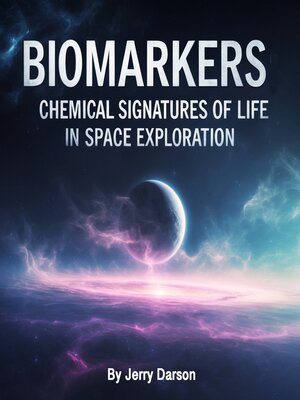Biomarkers
audiobook (Unabridged) ∣ Chemical Signatures of Life in Space Exploration
By Jerry Darson

Sign up to save your library
With an OverDrive account, you can save your favorite libraries for at-a-glance information about availability. Find out more about OverDrive accounts.
Find this title in Libby, the library reading app by OverDrive.



Search for a digital library with this title
Title found at these libraries:
| Library Name | Distance |
|---|---|
| Loading... |
This audiobook is narrated by a digital voice.
Biomarkers are measurable chemical indicators that signal the presence, activity, or remnants of life. In the context of astrobiology and space exploration, biomarkers—also referred to as biosignatures—are essential tools for detecting and understanding extraterrestrial life. These molecular traces can include a range of substances, such as specific gases, organic molecules, isotopic patterns, or even physical structures, all of which suggest biological processes either past or present. The concept of biomarkers bridges biology, chemistry, and planetary science, offering a scientific framework for assessing whether life could exist or has ever existed beyond Earth.
The study of biomarkers in space exploration is rooted in the recognition that life, as we know it, leaves behind distinctive chemical footprints. These can be generated through metabolic processes, cellular decay, or even environmental interactions involving living organisms. For instance, the presence of methane in the Martian atmosphere has generated considerable interest because, while methane can be produced abiotically, it is also a byproduct of microbial life on Earth. Differentiating between biological and non-biological sources of such molecules is a central challenge in astrobiology.
Understanding biomarkers also requires context. Environmental conditions—such as temperature, radiation levels, and chemical composition—can influence the formation, alteration, or destruction of potential biosignatures. This means that detecting a biomarker isn't just about identifying a molecule; it involves interpreting it within its geological and atmospheric setting. A molecule that is a strong biomarker on Earth may not hold the same implications on Mars or a distant exoplanet, where environmental processes can mimic or obscure biological signatures.







